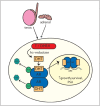Pathogenesis of prostate cancer and hormone refractory prostate cancer
- PMID: 19675761
- PMCID: PMC2721494
- DOI: 10.4103/0970-1591.30265
Pathogenesis of prostate cancer and hormone refractory prostate cancer
Abstract
Prostate cancer is the second most common malignancy in males and the leading cause of cancer death. Prostate cancer is initially androgen dependent and relies upon the androgen receptor (AR) to mediate the effects of androgens. The AR is also the target for therapy using antiandrogens and LHRH analogues. However, all cancers eventually become androgen independent, often referred to as hormone refractory prostate cancer. The processes involved in this transformation are yet to be fully understood but research in this area has discovered numerous potential mechanisms including AR amplification, over-expression or mutation and alterations in the AR signaling pathway. This review of the recent literature examines the current knowledge and developments in the understanding of the molecular biology of prostate cancer and hormone refractory prostate cancer, summarizing the well characterized pathways involved as well as introducing new concepts that may offer future solutions to this difficult problem.
Keywords: Prostate cancer; refractory androgen receptor.
Conflict of interest statement
Figures




Similar articles
-
Androgen receptor signaling in androgen-refractory prostate cancer.J Natl Cancer Inst. 2001 Nov 21;93(22):1687-97. doi: 10.1093/jnci/93.22.1687. J Natl Cancer Inst. 2001. PMID: 11717329 Review.
-
Androgen receptors in hormone-dependent and castration-resistant prostate cancer.Pharmacol Ther. 2013 Dec;140(3):223-38. doi: 10.1016/j.pharmthera.2013.07.003. Epub 2013 Jul 13. Pharmacol Ther. 2013. PMID: 23859952 Review.
-
Hormone treatment for prostate cancer: current issues and future directions.Cancer Chemother Pharmacol. 2005 Nov;56 Suppl 1:58-63. doi: 10.1007/s00280-005-0100-x. Cancer Chemother Pharmacol. 2005. PMID: 16273367
-
The androgen receptor can signal through Wnt/beta-Catenin in prostate cancer cells as an adaptation mechanism to castration levels of androgens.BMC Cell Biol. 2008 Jan 24;9:4. doi: 10.1186/1471-2121-9-4. BMC Cell Biol. 2008. PMID: 18218096 Free PMC article.
-
The androgen receptor as putative therapeutic target in hormone-refractory prostate cancer.Recent Pat Anticancer Drug Discov. 2007 Nov;2(3):203-11. doi: 10.2174/157489207782497172. Recent Pat Anticancer Drug Discov. 2007. PMID: 18221063 Review.
Cited by
-
Androgen Signaling Regulates SARS-CoV-2 Receptor Levels and Is Associated with Severe COVID-19 Symptoms in Men.Cell Stem Cell. 2020 Dec 3;27(6):876-889.e12. doi: 10.1016/j.stem.2020.11.009. Epub 2020 Nov 17. Cell Stem Cell. 2020. PMID: 33232663 Free PMC article.
-
Androgen Regulates SARS-CoV-2 Receptor Levels and Is Associated with Severe COVID-19 Symptoms in Men.bioRxiv [Preprint]. 2020 May 15:2020.05.12.091082. doi: 10.1101/2020.05.12.091082. bioRxiv. 2020. Update in: Cell Stem Cell. 2020 Dec 3;27(6):876-889.e12. doi: 10.1016/j.stem.2020.11.009. PMID: 32511360 Free PMC article. Updated. Preprint.
-
Green synthesis of zinc oxide nanoparticles from Wodyetia bifurcata fruit peel extract: multifaceted potential in wound healing, antimicrobial, antioxidant, and anticancer applications.Front Pharmacol. 2024 Aug 5;15:1435222. doi: 10.3389/fphar.2024.1435222. eCollection 2024. Front Pharmacol. 2024. PMID: 39161893 Free PMC article.
-
Diagnosis and Treatment of Inguinal Hernias after Surgical Treatment of Prostate Cancer, Current State of the Problem.J Clin Med. 2022 Sep 15;11(18):5423. doi: 10.3390/jcm11185423. J Clin Med. 2022. PMID: 36143069 Free PMC article.
-
Translocator Protein 18 kDa (TSPO): A Promising Molecular Target for Image-Guided Surgery of Solid Cancers.Adv Pharm Bull. 2024 Mar;14(1):86-104. doi: 10.34172/apb.2024.015. Epub 2023 Oct 14. Adv Pharm Bull. 2024. PMID: 38585455 Free PMC article. Review.
References
-
- Office for National Statistics. Office for National Statistics. London: 2005. Cancer statistics - registrations, England, 2003. Series MB1 no. 34.
-
- Huggins C, Hodges CV. Studies on prostatic cancer: The effects of castration, of oestrogen and of androgen injection on serum phosphatases in metastatic carcinoma of the prostate. Cancer Res. 1941;1:293–7. - PubMed
-
- Denis L, Murphy GP. Overview of phase III trials on combined androgen treatment in patients with metastatic prostate cancer. Cancer. 1993;72:3888–95. - PubMed
-
- Trachtenberg J, Blackledge G. Looking to the future. Advances in the management of hormone-refractory prostate cancer. Eur Urol Suppl. 2002;1:44–53.
-
- Tilley WD, Clarke CL, Birrell SN, Bruchovsky N. Hormones and cancer: New insights, new challenges. Trends Endocrinol Metab. 2001;12:186–8. - PubMed
LinkOut - more resources
Full Text Sources
Research Materials

